Second attack this week on Iraqi airbase hosting US troops
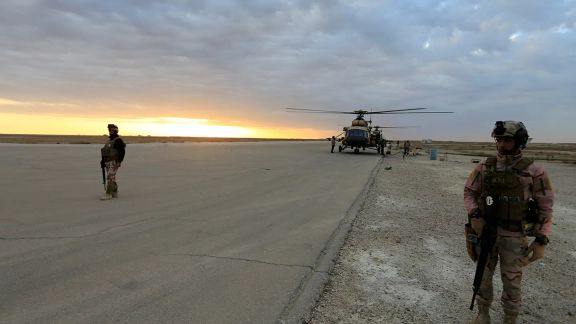
Multiple rockets were launched at Iraq's Ain al-Asad airbase housing US-led forces late on Thursday, American and Iraqi sources said, with no damage or casualties reported.

Multiple rockets were launched at Iraq's Ain al-Asad airbase housing US-led forces late on Thursday, American and Iraqi sources said, with no damage or casualties reported.
Two US officials said the base itself had not been struck in the attack. This was the second such attack this week. Two drones were fired at the base on Tuesday, with no casualties.
The attack came two days after a military summit in Washington where Iraqi and US officials discussed winding down the coalition's work a decade after it was formed to fight Islamic State as it stormed across Iraq and Syria.
No major announcement was made at the end of the talks, though US and Iraqi sources say an announcement that it will begin to gradually wind down is likely in the coming weeks.
Iran’s Islamic government has long campaigned for US troops to leave Iraq, where it has established wide-ranging influence by creating armed militia groups. As a result, Iran-aligned Iraqi political and military factions have pressured the country's government to quickly draw down the coalition's work and say they want all 2,500 troops deployed by the country's one-time occupier to leave.
Washington and the Iraqi government say they want to transition to a bilateral security relationship that would likely see some troops remain in an advisory role.
US-led forces invaded Iraq in 2003, toppled former leader Saddam Hussein and then withdrew in 2011, only to return in 2014 to fight Islamic State at the head of the coalition.
Iran-backed Iraqi armed factions have targeted bases housing US troops in Iraq and Syria over the years and particularly since the Israel-Hamas war began on October 7, though there have only been a handful of attacks since February, when the US retaliated and an unofficial truce took hold.
The latest attacks come after Masoud Pezeshkian, who is presented as a “moderate” won the presidential election in Iran, raising some expectations in the West that he might restart nuclear talks. However, the United States has dismissed such suggestions, giving little credence to major changes under the new president.
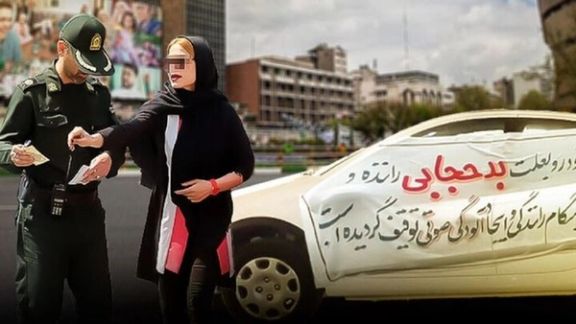
Masoud Pezeshkian promised voters to stop hijab patrols and violence against women for violations, but the acting chief of police insists the same policies will continue under the new government.
Speaking at a security meeting in Qazvin Province Wednesday, Qasem Rezaei said implementation of the government's hijab enforcement initiative, known as the Nour (Light) Plan, will continue irrespective of the change in administrations.
Under the Nour Plan, businesses face closure if they fail to ensure compliance with hijab regulations among their customers, and cars are impounded if passengers are unveiled.
At a press briefing in Rasht a few weeks before the recent snap elections, Rezaei claimed that the enforcement of the hijab plan was a popular demand. He labeled unveiling as a "soft threat" and a "sedition" used by the enemy, urging the parliament to urgently pass a bill imposing cash fines and other punishments on women for unveiling.
The bill, originally drawn up by the government of President Ebrahim Raisi in July 2023, is officially titled "Protection of Family Through Promotion of Hijab and Chastity Culture".
The proposed bill secured parliamentary approval in September 2023 but has not yet come into effect due to formal objections raised by the Guardian Council which many believe stemmed from fears of a popular backlash rather than disagreement with its provisions.
Pezeshkian, who defended hijab enforcement in the early years of the Islamic Republic after 1979, has on several occasions in the past few years, including during recent election debates, denounced the deployment of the morality police and violence against women for “a few locks of hair”.
“We have been trying to institutionalize the hijab for forty years. Those behind the Nour Plan should tell us whether its implementation will lead us to light or there is darkness at the end,” Pezeshkian said in a campaign speech to a gathering of women on June 14.
Some women’s rights activists believe that Pezeshkian neither has the strong will to challenge hardliners over hijab and morality patrols, nor is invested with the power to do so as president.
Shirin Shams, a women’s rights activist, told Iran International that the police official’s statement was intended more for those within the ruling establishment, including Pezeshkian, who oppose the use of violence to enforce hijab. It was not aimed at Iranian society or the women who are determined to maintain the progress gained through hijab defiance.
Pointing out that it is unlikely the acting chief of the police was unaware of Masoud Pezeshkian’s promise to end the implementation of the hijab enforcement plan, prominent journalist Ahmad Zeidabadi criticized Rezaei for undermining Pezeshkian a few days ahead of his inauguration.
“The bigger question is why this police official did not say these things when Mr. Pezeshkian was trying to convince the people [who did not want to vote] to go to the ballot boxes … and is underscoring the powerlessness of the president about the matter now that [the election] is over?” Zeidabadi asked in a social media post.
Citizen reporters say enforcement of hijab was somehow relaxed after the death of President Ebrahim Raisi in a helicopter crash in May and during the following weeks when the but has once again picked up after the presidential elections.
The patrols had also largely vanished from the streets following the death of Mahsa (Jina) Amini at the age of 22 in the custody of the morality police in September 2022. Her death sparked extensive protests that persisted for several months. Once the protests were repressed, the enforcement returned in 2023.
There has been a significant increase in the number of unveiled women, even in many traditionally conservative towns and cities, since Amini’s death.
Pezeshkian, who was a lawmaker at the time, strongly condemned the police violence against Amini one day after her death, and the crackdown on protesters in a fiery speech in the parliament.
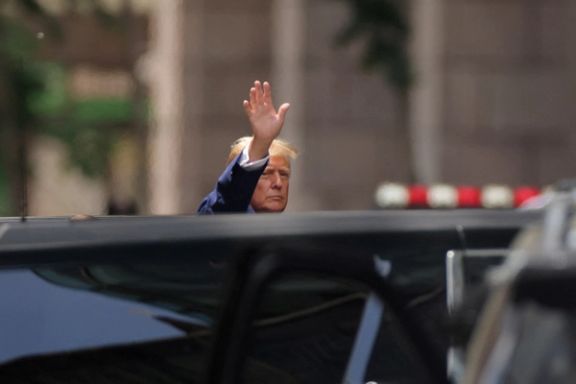
Republican presidential candidate Donald Trump, in a social media post on Thursday, called for the annihilation of Iran if they ever assassinate him, following reports of such plots by Tehran.
His statement was made alongside a video clip of Israeli Prime Minister Benjamin Netanyahu's speech to the US Congress on Wednesday, where Netanyahu emphasized Iran's threats.
On Truth Social, Trump wrote, “If they do ‘assassinate President Trump,’ which is always a possibility, I hope that America obliterates Iran, wipes it off the face of the Earth — If that does not happen, American Leaders will be considered ‘gutless’ cowards!”
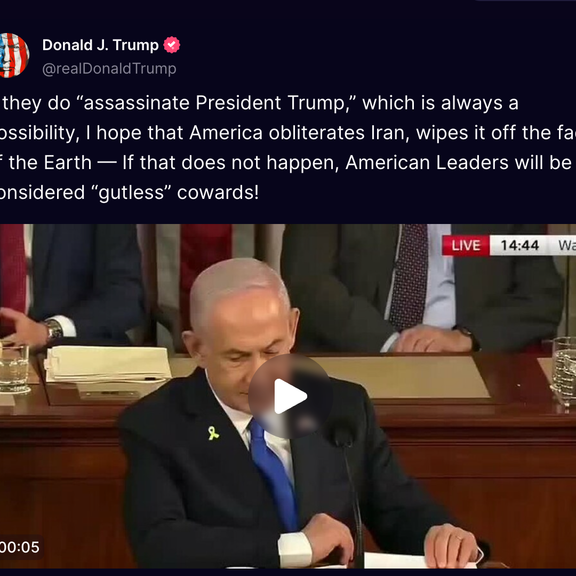
US authorities were reportedly aware of an alleged Iranian plan to assassinate Trump before an attempt on his life occurred at a rally. On July 13, twenty-year-old Thomas Michael Crooks opened fire at a Trump rally in Butler, Pennsylvania, killing a former volunteer fire chief and injuring two others. Trump was slightly injured in his ear.
However, no direct link has been found between the reported Iranian plot and the attempted assassination.
In a recent interview with Iran International, Trump's former national security aide John Bolton said that naturally Trump would take the Iranian threat personally.
Trump withdrew from the Obama-era JCPAO nuclear deal with Iran in 2018 and imposed heavy sanctions, that have crippled Iran's weak economy.
Relations between the US and Iran became more strained since the 2020 US drone strike that killed Qasem Soleimani, the former commander of the Revolutionary Guards Quds Force, and Iran's top military intelligence operative in the Middle East.
Iranian officials, both political and military, have persistently issued threats against Trump and former members of his administration to avenge Soleimani's death, who orchestrated Iran's proxy operations throughout the region. For instance, in February 2023, Amirali Hajizadeh, the head of the Revolutionary Guards aerospace force, explicitly declared that the Islamic Republic intends to kill Trump.
In January 2022, Iran's former President Ebrahim Raisi vowed retaliation for Soleimani's killing unless former US President Donald Trump was brought to trial.
"If Trump and (former Secretary of State Mike) Pompeo are not tried in a fair court for the criminal act of assassinating General Soleimani, Muslims will take our martyr's revenge," Raisi said in a televised speech.
In 2022, the US Justice Department brought charges against a member of the IRGC for plotting to assassinate John Bolton, Trump's former national security adviser, likely in retaliation for Soleimani's death. Similar threats have been directed at other former Trump administration officials, including Mike Pompeo and Robert O'Brien, who continue to have security details due to ongoing risks.
Soleimani played a crucial role in Iran's external military and intelligence operations, often orchestrating hostilities against US forces in the region. Despite Iran's denials, the security concerns for those involved in the decision to kill Soleimani remain significant, necessitating ongoing protection measures.
Trump's post echoes his controversial rhetoric from 2019, when he threatened the "obliteration" of Iran if they attacked "anything American."
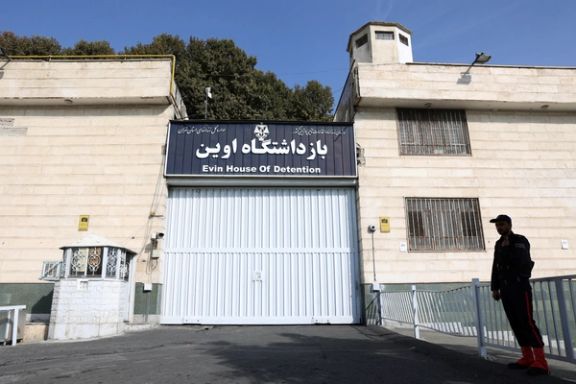
Sixty female political prisoners at Tehran’s Evin Prison staged an overnight sit-in on Wednesday to protest the recent death sentence of fellow inmate, Pakhshan Azizi.
The Instagram accounts of Nobel Laureate Narges Mohammadi, Iranian civil rights activist Golrokh Iraee, and German-Iranian rights activist Nahid Taghavi jointly announced that Evin's women unanimously demand the annulment of the Iranian-Kurdish political prisoner's death sentence.
The political prisoners at Ghezel Hesar Prison in Karaj also stated solidarity, condemning the "violation of the right to life of the Iranian people by the execution machine of the Islamic Republic."
They emphasized that resistance and protest against repression and executions would continue unabated. They urged international human rights organizations to address the new wave of executions.
Since the establishment of the Islamic Republic, Iran's Kurdish minority has experienced significant persecution. The rights organization Hengaw reports that during the first half of 2024, Iran executed at least 266 people as part of an ongoing execution spree. Of those executed, 72 were Kurds, Iran's largest minority.
Azizi is the second woman in the past month sentenced to death for "armed rebellion," following labor activist Sharifeh Mohammadi. The Hengaw Human Rights Organization which focuses on Iran's oppressed Kurdish minority, reported that Azizi was deprived of legal counsel and family visits for months, denying her a fair trial.
Hengaw published a letter from Azizi detailing torture and hanging during her detention. Authorities have also refused her family contact for the past two weeks.
The death sentence for labor activist Sharifeh Mohammadi, convicted on fabricated charges of armed rebellion, was announced a day before Masoud Pezeshkian's victory in the July 5 presidential runoff. The Campaign to Defend Mohammadi, initiated by her family on Instagram, argues the sentence is unjust based on her decade-old membership in a legal labor organization.
In early July, the Norway-based Iran Human Rights Organization (IHRNGO) warned of a probable surge in executions following the Iranian presidential election.
Mahmood Amiry-Moghaddam, the director of IHRNGO, noted that Iranian authorities historically decrease executions "to encourage participation in the elections," only to increase them afterward sharply. He urged both the international community and the Iranian public to brace for and appropriately respond to this potential wave of executions.
Amnesty International's annual report on the death penalty, released in May, highlighted Iran's rising execution rates, revealing that nearly 74% of all recorded executions worldwide last year occurred in Iran.
The report found that the Iranian government has intensified its use of the death penalty following the Mahsa movement to "instil fear among the people and tighten its grip on power."
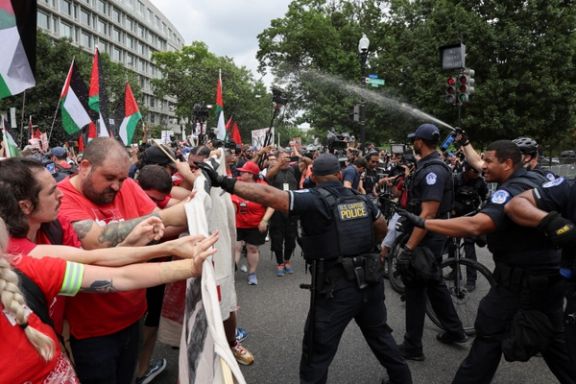
Iran's Supreme Leader Ali Khamenei has criticized the United States for its handling of recent anti-Israeli demonstrations, despite his own security forces killing thousands over the past five years.
On Thursday, Khamenei accused the US government and police of trampling on students "right in front of the people, cameras, and the world's media."
In recent months, the US has witnessed a surge of protests against Israel, particularly in response to the ongoing conflict in Gaza. These demonstrations, often led by students, have been praised by Iranian officials as proof that their political ideology is taking root in Western countries.
"What they [the US] wanted to do in Iran has now happened to them,” Khamenei added, referring to his conspiracy theory that protests in Iran were an American plot.
Several rounds of widespread anti-regime protests shook Iran in 2017, 2019 and 2022. More than 2,000 protesters were killed by security forces and around 30,000 arrested. Iran has also hanged hanged dozens of dissidents and political prisoners in the past decade.
Khamenei took credit for protests in the United States, saying these are "blessings" brought on by Iran's Islamic revolution and its founder ayatollah Ruhollah Khomeini. The protests are "unprecedented phenomenon in contemporary history," he said.
Israeli Prime Minister Benjamin Netanyahu condemned the protesters as "Iran's useful idiots." In a speech to the US Congress on July 24, Netanyahu stated, "I have a message for these protesters: When the tyrants of Tehran who hang gays from cranes and murder women for not covering their hair are praising, promoting, and funding you, you have officially become Iran's useful idiots."
Thousands of people gathered in Washington DC on Wednesday, to protest against Israeli Prime Minister Benjamin Netanyahu. They attacked monuments and burned American flags chanting praise for Hamas and threats against Jews.
Netanyahu's comments come amid a backdrop of intense conflict in Gaza. Since the war began, following the Hamas attack on Israel, leftist and pro-Palestinian students mobilized across US campuses to oppose Israel’s actions. The Hamas invasion of October 7, which resulted in the deaths of 1,200 mostly civilians, triggered a harsh retaliation from Israel. According to Hamas, over 35,000 Palestinians have since been killed. However, Israel continues its campaign to eliminate Hamas and rescue the remaining 125 hostages in Gaza. Throughout the conflict, the US has defended Israel's right to self-defense.
Khamenei, who has spent 35 years of his authoritarian rule campaigning against Israel and the West, is leveraging these protests to bolster his anti-Western narrative. By showcasing anti-Israeli and anti-Western sentiment abroad, Khamenei aims to justify his government’s actions and ideology both at home and on the international stage.
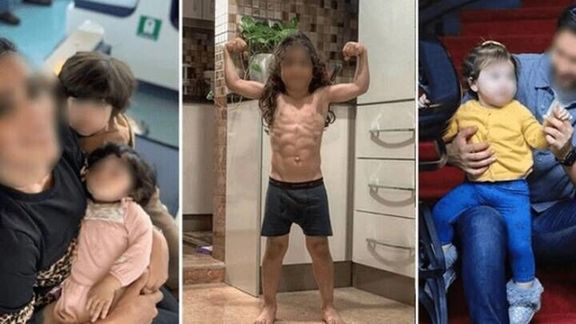
Iran's absence of regulation is seeing children as young as toddlers exploited online as desperate families use unscrupulous measures to make ends meet amid the country's economic crisis.
Children, often as young as toddlers, are being used to create content for social media on platforms such as Instagram with some posts earning as much as $200 for better known 'influencers,' the equivalent of an average month's salary in Iran.
The desire for visibility, fame, and most importantly, income, is at the heart of the trend. Some parents generate revenue by documenting every aspect of their children’s lives since their birth.
Research done by Iran International on some of these pages shows that advertising rates can vary. A story to advertise a product might cost around $100, but if the child plays with a toy or wears the advertised diapers, the cost can rise to $200. Depending on the promotion method, prices can range between $10 to $1000.
"Child labor in the digital space, where children are engaged in income-generating activities while dressed neatly and fashionably, has been overlooked by many," wrote Nazila Ansaripour, a social affairs expert from Isfahan, in a report by Mehr News Agency on Sunday.
Until a few years ago, child labor involved things like selling flowers and gum at intersections or those working in underground workshops.
However, the emergence of social networks such as Instagram has led to the concept of virtual child labor. Children are placed in front of a camera by one or more family members to produce content for social media due to their beauty, charm, or skill.
The business of sacrificing childhood
This instrumental use of children, according to experts, can lead to disorders in their interactions with peers. When all of a parent's thoughts and behaviors focus on exploiting the child, it is expected that the child's needs will not be met, leading to potential anger towards their parents in adulthood.
"When a child grows up to become a CEO or engages in political activities, that photo or video is not deleted. This can lead to various social and psychological pressures on that person," Samaneh Savadi, a law expert from the UK's University of Sussex in Brighton, told Iran International.
Shadi Ramez, a psychiatrist, told Iran International it also impairs personal development. “A way to ensure healthy development in children is to give them the chance to define their identities without any conditions through trial and error. Unfortunately, child influencers lack this opportunity because they are pressured to maintain a persona created for them on social media, preventing them from experiencing trial and error.”
Government apathy or complicity?
Iran’s government, notorious for its heavy-handed internet censorship, is conspicuously silent on the issue of child exploitation on social media. While websites critical of the government are swiftly shut down and dissidents relentlessly pursued, platforms rife with child exploitation continue to flourish.
Although laws were approved in 2020 to protect child laborers in Iran, no practical steps have been taken to enforce them. Some observers believe that the government is fully aware of these practices but does nothing to stop them. Instead, they focus on censoring political dissent while such abusive practices continue unchecked.
While the country continues to spiral into poverty amid global sanctions, according to Iran's Parliament Research Center, 15% of the country's children are now engaged in labor activities.
At least 10% of these working children do not have the opportunity to attend school, depriving them of essential educational opportunities, the report revealed last year.
In 2017, out of nine million Iranian children, 499,000 were considered "active," signifying that nearly half a million children in the country were either engaged in labor or searching for work.
But the latest report suggests that the population of working children has now reached approximately 1.35 million, based on an estimated 15% involvement in child labor as the country's crisis escalates.